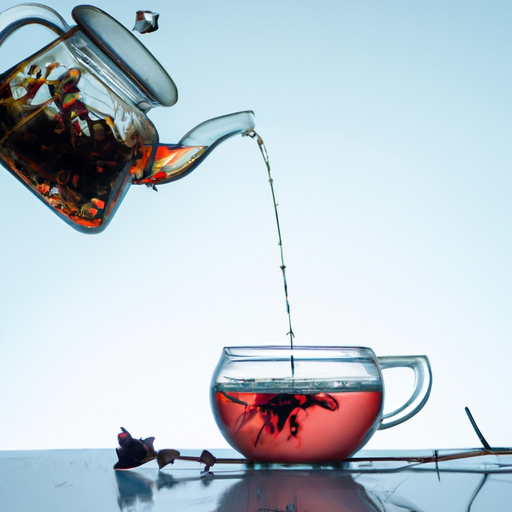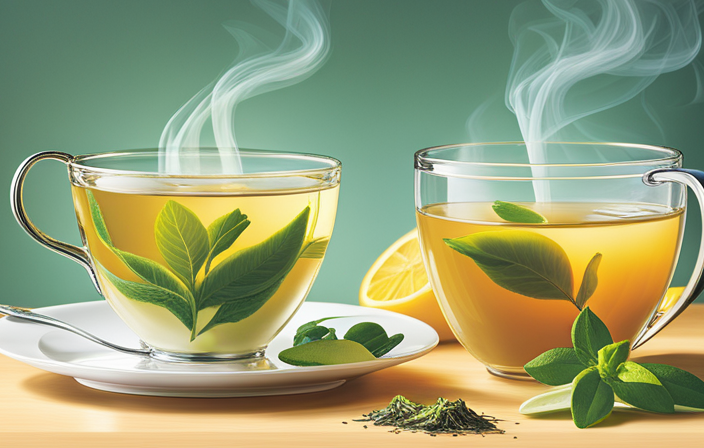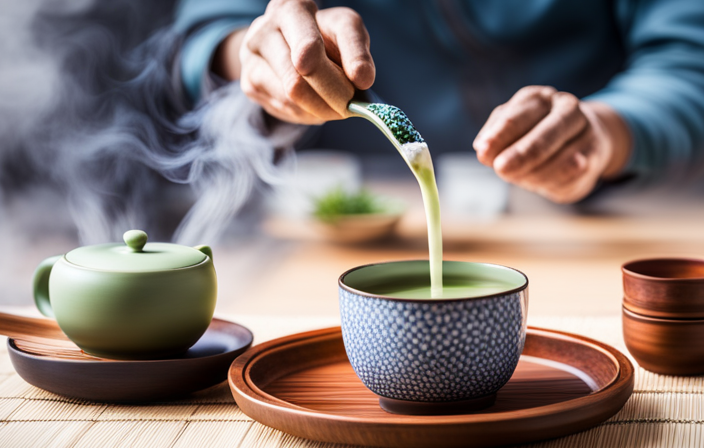Turmeric Tea
Does Turmeric Tea Have Caffeine?

Have you ever tried turmeric tea? It’s a trendy beverage that has been gaining popularity in recent years due to its many health benefits. As someone who is sensitive to caffeine, I was interested to find out if turmeric tea contains any caffeine.
After all, I don’t want to accidentally consume caffeine and end up with a sleepless night. As I began my research, I found that turmeric tea is made by steeping grated or powdered turmeric root in hot water. This tea is known for its anti-inflammatory properties and is often used as a natural remedy for various ailments.
But the question remains: does turmeric tea contain caffeine? In this article, I will explore this question in-depth and provide you with all the information you need to know about caffeine in turmeric tea.
Key Takeaways
- Turmeric tea does not contain caffeine, making it a great alternative to other caffeinated beverages.
- Pregnant women should limit their daily caffeine intake to 200 milligrams or less, making turmeric tea a safe option for them.
- Turmeric tea is known for its anti-inflammatory and immune-boosting properties, making it a healthy choice for those looking to improve their overall health.
- The decision to drink turmeric tea with or without caffeine comes down to personal preference, but it’s important to keep in mind the potential drawbacks of consuming too much caffeine.
Understanding Turmeric Tea
Turmeric tea is a delicious and healthy beverage that doesn’t contain caffeine. It’s made by steeping fresh or dried turmeric root in hot water along with other ingredients like ginger, lemon, honey, or black pepper. Turmeric is a spice that has been used in traditional medicine for centuries due to its various health benefits. It contains curcumin, a powerful antioxidant and anti-inflammatory compound that helps to boost immunity, reduce inflammation, and improve brain function.
There are many turmeric tea recipes available, each with its unique taste and health benefits. Some people like to add cinnamon, cloves, or cardamom to their tea to enhance its flavor and aroma. Others prefer to use turmeric powder or supplements to get the same health benefits.
Regardless of the recipe, turmeric tea is a great way to enjoy the health benefits of turmeric without consuming caffeine. But, does turmeric tea contain caffeine? Let’s find out.
Does Turmeric Tea Contain Caffeine?
There’s no buzz in turmeric tea, so you can enjoy it at any time of the day without worrying about getting wired. Unlike coffee or black tea, turmeric tea is caffeine-free, making it an excellent alternative for those who are looking for caffeine-free options.
Despite being caffeine-free, turmeric tea has many health benefits that make it an excellent addition to your daily routine. Turmeric tea benefits include reducing inflammation, improving brain function, and boosting the immune system. It’s also a great way to detoxify your body and improve digestion.
With all of these benefits, it’s no wonder why turmeric tea has become popular among health enthusiasts. In the next section, we’ll take a closer look at the pros and cons of caffeine in turmeric tea.
The Pros and Cons of Caffeine in Turmeric Tea
As someone who enjoys drinking turmeric tea, it’s important for me to understand the pros and cons of caffeine in this beverage.
On one hand, caffeine can provide benefits such as increased alertness and improved cognitive function.
However, there are also drawbacks to consuming too much caffeine, such as anxiety and disrupted sleep.
It’s important to consider who should avoid caffeine in turmeric tea, such as individuals with certain medical conditions or those who are sensitive to caffeine.
Benefits of Caffeine
You’ll feel more alert and energized after consuming caffeine, giving you a boost to tackle your day. Here are three benefits of caffeine that you may not have known:
-
Improved Physical Performance: Caffeine can enhance physical performance by increasing endurance, reducing fatigue, and improving muscle strength.
-
Increased Focus and Productivity: Caffeine is known to improve mental alertness, focus, and productivity, which can help you to be more efficient and effective at work or school.
-
Reduced Risk of Certain Diseases: Studies have shown that caffeine consumption can reduce the risk of certain diseases such as Parkinson’s disease, Alzheimer’s disease, and liver disease.
While caffeine has its benefits, it’s important to remember that it’s not the only option for improving focus and energy levels. In the next section, we’ll explore some alternatives to caffeine and the drawbacks of its consumption.
Drawbacks of Caffeine
Caffeine is a double-edged sword, with its benefits come drawbacks, like a sharp blade with two edges. While caffeine can improve alertness, reaction time, and cognitive performance, it can also cause jitteriness, anxiety, and insomnia.
The impact of caffeine on sleep is particularly relevant, as it can disrupt the natural cycles of sleep and wakefulness, leading to poor sleep quality and quantity. Moreover, caffeine can have a different half-life in different people, meaning that some individuals may be more sensitive to its effects than others.
Fortunately, there are alternatives to caffeine that can provide similar benefits without the drawbacks. For example, green tea contains theanine, an amino acid that can promote relaxation and mental clarity. Herbal teas like chamomile, lavender, and valerian can also have a calming effect on the nervous system, helping to reduce stress and anxiety. Another option is to exercise regularly, as physical activity can increase blood flow, oxygenation, and neurotransmitter release, all of which can enhance mental and physical performance.
In the next section, we’ll explore who should avoid caffeine in turmeric tea and why.
Who Should Avoid Caffeine in Turmeric Tea?
If you want to avoid feeling anxious or restless, it’s important to know who should steer clear of the caffeine in turmeric tea. Individuals who are caffeine sensitive should be cautious about consuming turmeric tea, as it may cause jitters, insomnia, or even heart palpitations. Caffeine sensitivity varies from person to person, so it’s important to listen to your body and adjust your intake accordingly.
Pregnant women should also be mindful of their caffeine intake when consuming turmeric tea. While turmeric itself is generally considered safe during pregnancy, excessive caffeine intake can lead to complications such as low birth weight, preterm labor, and miscarriage. It’s recommended that pregnant women limit their daily caffeine intake to 200 milligrams or less. As a result, it’s best for pregnant women to consult with their healthcare provider before consuming turmeric tea with caffeine.
To avoid the potential negative effects of caffeine, there are plenty of ways to make caffeine-free turmeric tea. One option is to simply use less turmeric and more other ingredients such as ginger, lemon, or honey. Another option is to use turmeric powder instead of fresh turmeric root, as this tends to have less caffeine. By making these substitutions, you can still enjoy the health benefits of turmeric without worrying about the effects of caffeine.
How to Make Caffeine-Free Turmeric Tea
I’ve found that turmeric tea is a great way to incorporate the health benefits of turmeric into my daily routine. However, as I’ve learned, not all turmeric teas are created equal. Some contain caffeine, which can be a pro or a con depending on your preferences and needs.
In this discussion, I’ll provide a summary of key points to consider when making an informed decision on turmeric tea with or without caffeine, as well as other important considerations for turmeric tea lovers.
Summary of Key Points
You’ll be glad to know that turmeric tea is caffeine-free, making it a great option for those looking for a warm and soothing beverage without the jitters. But aside from that, there are also various health benefits and flavor variations that make turmeric tea a popular choice among health enthusiasts and tea lovers alike.
In terms of health benefits, turmeric tea is known for its anti-inflammatory and antioxidant properties. It also helps boost the immune system and aids in digestion. As for flavor variations, turmeric tea can be made with a variety of spices and herbs such as ginger, cinnamon, and honey, giving it a unique and comforting taste. With all these benefits and flavor options, turmeric tea is definitely worth trying out for those who are looking for a healthier alternative to their usual hot beverages.
Transition: Now that we know that turmeric tea is caffeine-free and loaded with health benefits, it’s important to make an informed decision on whether to enjoy it with or without caffeine.
Making an Informed Decision on Turmeric Tea with or without Caffeine
Deciding whether to enjoy turmeric tea with or without caffeine can be a simple and enjoyable process. Here are a few things to consider when making an informed decision:
-
Caffeine alternatives: If you’re looking to avoid caffeine, turmeric tea is a great option. You can still enjoy the warm and comforting beverage without the added stimulation of caffeine. Some great caffeine-free alternatives to turmeric tea include ginger tea, chamomile tea, and peppermint tea.
-
Health benefits: Turmeric is known for its anti-inflammatory properties and has been used for centuries in traditional medicine. Drinking turmeric tea, regardless of caffeine content, can provide numerous health benefits such as improved digestion, reduced inflammation, and boosted immune function.
-
Personal preference: Ultimately, the decision to drink turmeric tea with or without caffeine comes down to personal preference. Some people enjoy the added energy boost from caffeine, while others prefer to avoid it altogether. Experiment with different options to find what works best for you.
When considering turmeric tea, there are other factors to keep in mind beyond caffeine content.
Other Considerations for Turmeric Tea Lovers
One thing to keep in mind when enjoying turmeric tea is that it can add a burst of flavor to any dish, making it the perfect ingredient for any culinary adventure. Aside from its culinary uses, turmeric tea also offers a host of health benefits.
It’s known to have anti-inflammatory and antioxidant properties, which can help boost the immune system and reduce the risk of chronic diseases. If you’re looking to make your own turmeric tea recipe, it’s important to note that while turmeric itself does not contain caffeine, some tea blends may have added caffeine.
If you’re sensitive to caffeine or simply want to avoid it, be sure to check the label before purchasing. Overall, turmeric tea is a delicious and healthy way to add some spice to your life, and it’s worth giving it a try!
Frequently Asked Questions
What are the health benefits of turmeric tea besides caffeine content?
I love drinking turmeric tea for its numerous health benefits. It’s anti-inflammatory, improves brain function, and has antioxidant properties. There are also many delicious recipes with turmeric that make it easy to incorporate into my daily routine.
How does the taste of turmeric tea compare to other types of tea?
I have found that the flavor of turmeric tea is unique, with a slightly bitter and earthy taste. In comparison to other types of tea, it has a more distinct flavor profile. Turmeric tea taste comparison reveals a strong and spicy taste.
Can turmeric tea be consumed at any time of day or is it recommended to drink it at a specific time?
The best time to drink turmeric tea is in the morning due to its health benefits and lack of caffeine. It can also be enjoyed at night as it does not disrupt sleep.
Is it safe to consume turmeric tea daily or are there any potential negative side effects?
Although turmeric tea has potential health benefits, consuming it daily may also have negative side effects. It is important to weigh the pros and cons and consult a healthcare provider. Claims about turmeric tea aiding in weight loss are currently inconclusive.
Are there any specific brands or types of turmeric tea that are recommended for optimal taste and health benefits?
When it comes to turmeric tea types, I recommend looking for organic options that use high-quality ingredients. Some of the best brands include Traditional Medicinals, Yogi, and Numi Organic Tea. These brands offer a variety of flavors and health benefits.
Conclusion
Well, folks, after diving into the topic of caffeine in turmeric tea, I can confidently say that this spicy beverage is a game-changer.
Not only does it offer a wealth of health benefits, but it also gives you the energy boost you need without the jitters of traditional caffeine.
With its anti-inflammatory properties, turmeric tea is a must-try for anyone looking to improve their overall wellness.
And the fact that it’s caffeine-free means you can enjoy it any time of day without worrying about staying up all night.
So, if you’re looking for a tasty and healthy alternative to your morning cup of joe, give turmeric tea a try – your body (and taste buds) will thank you!
Turmeric Tea
Can You Drink Chamomile Tea On Low Fodmap Diet

As I sit here, enjoying a cozy cup of chamomile tea, the soothing scent fills the room, calming my senses and easing my mind. Chamomile tea is known for its gentle and comforting qualities, making it a go-to option for those looking for peace and relaxation.
But for those following a low FODMAP diet, a question arises: can you enjoy the benefits of chamomile tea without disrupting your digestive system?
The low FODMAP diet is designed to alleviate symptoms of irritable bowel syndrome (IBS) by reducing intake of certain carbohydrates that can trigger digestive distress. FODMAPs, short for fermentable oligosaccharides, disaccharides, monosaccharides, and polyols, are found in a variety of foods and beverages, including some herbal teas.
But fear not, fellow tea lovers, for chamomile tea is a delightful exception.
In this article, we will delve into the world of chamomile tea and its compatibility with a low FODMAP diet. We will explore the potential benefits of chamomile tea, its impact on the digestive system, and provide you with recipes and ideas for incorporating this soothing brew into your low FODMAP lifestyle.
So sit back, relax, and let’s unravel the wonders of chamomile tea on a low FODMAP diet.
Key Takeaways
- Chamomile tea is low in FODMAPs and can be enjoyed on a low FODMAP diet.
- Chamomile tea has anti-inflammatory properties that can soothe the digestive system and alleviate symptoms such as stomach cramps and indigestion.
- Chamomile tea has a calming effect on the body, which can be beneficial for individuals with IBS who may experience stress-related symptoms.
- It’s important to check the ingredients of herbal teas before consuming them, as some may contain high FODMAP ingredients that can trigger symptoms.
Understanding the Low FODMAP Diet
If you’re on a low FODMAP diet, you can drink chamomile tea. The low FODMAP diet aims to improve digestive health for individuals with irritable bowel syndrome (IBS). FODMAPs are carbohydrates that can trigger symptoms like bloating, gas, and abdominal pain. Chamomile tea is considered low in FODMAPs and can be enjoyed on this diet.
Chamomile tea has been used for centuries as a natural remedy for various health conditions, including digestive issues. It has anti-inflammatory properties that can soothe the digestive system and alleviate symptoms such as stomach cramps and indigestion. Additionally, chamomile tea has a calming effect on the body, which can be beneficial for individuals with IBS who may experience stress-related symptoms.
While chamomile tea can provide relief for some digestive symptoms, it may not work for everyone. It’s always best to consult with a healthcare professional or registered dietitian before making any major changes to your diet, especially if you have specific dietary restrictions or medical conditions.
Exploring the Benefits of Chamomile Tea
Sipping on a warm cup of chamomile can bring a sense of calm and relaxation to your day. Not only is chamomile tea known for its soothing properties, but it can also be a great option for those following a low FODMAP diet.
FODMAPs, which stands for Fermentable Oligosaccharides, Disaccharides, Monosaccharides, and Polyols, are types of carbohydrates that can cause digestive discomfort in some individuals.
Chamomile tea is considered low in FODMAPs, making it a safe choice for those with sensitive stomachs. It contains compounds that have been shown to have anti-inflammatory and anti-spasmodic effects, which can help alleviate symptoms such as bloating and cramping.
If you’re looking for low FODMAP chamomile tea recipes, there are plenty of options available. You can simply steep chamomile flowers in hot water for a few minutes, or you can experiment with adding other low FODMAP ingredients like ginger or lemon for added flavor.
In addition to its digestive benefits, chamomile tea is also well-known for its relaxation properties. It can help promote sleep, reduce anxiety, and improve overall mood. So, if you’re looking to unwind after a long day, a cup of chamomile tea might just be what you need.
Transitioning to the next section about ‘chamomile tea and FODMAPs’, it’s important to understand how the tea can affect individuals with FODMAP sensitivities.
Chamomile Tea and FODMAPs
Indulging in a warm cup of chamomile tea can transport you to a tranquil oasis, but for individuals with FODMAP sensitivities, it’s essential to understand how this soothing beverage can impact their digestive comfort.
Chamomile tea has been enjoyed for centuries and is derived from the flowers of the chamomile plant, which is native to Europe and Asia. There are two main types of chamomile tea available: German chamomile and Roman chamomile. German chamomile is known for its potent anti-inflammatory properties, while Roman chamomile is often used for its calming effects on the nervous system.
For those following a low FODMAP diet, it’s important to note that chamomile tea is considered low FODMAP and can be consumed without triggering symptoms. This is good news for individuals looking for a soothing and calming drink that won’t upset their digestive system. However, it’s always a good idea to consult with a healthcare professional or registered dietitian before making any significant dietary changes.
Understanding the origins and different types of chamomile tea can help individuals with FODMAP sensitivities make informed choices about what they consume.
In the next section, we will explore the effects of chamomile tea on the digestive system and how it can promote overall digestive comfort.
The Effects of Chamomile Tea on the Digestive System
Consuming chamomile tea can have positive effects on the digestive system, promoting overall comfort and well-being. Here are three key reasons why chamomile tea is beneficial for your digestive health:
-
Improved Sleep: Chamomile tea has been used for centuries as a natural remedy for insomnia and sleep disorders. Its calming properties help relax the mind and body, making it easier to fall asleep and stay asleep throughout the night. By promoting a good night’s sleep, chamomile tea indirectly supports digestive health, as sleep deprivation can negatively impact the digestive system.
-
Anxiety Relief: Chamomile tea has been shown to reduce anxiety symptoms. Anxiety can have a direct impact on the digestive system, causing symptoms such as stomachaches, bloating, and diarrhea. By calming the mind and reducing anxiety, chamomile tea can help alleviate these digestive issues.
-
Anti-inflammatory Properties: Chamomile tea contains compounds that have anti-inflammatory effects. Inflammation in the digestive system can lead to various digestive disorders, including irritable bowel syndrome (IBS) and inflammatory bowel disease (IBD). By reducing inflammation, chamomile tea can help soothe the digestive system and improve overall gut health.
Transition: Now that we understand the beneficial effects of chamomile tea on the digestive system, let’s explore some recipes and ideas for enjoying this soothing beverage.
Recipes and Ideas for Enjoying Chamomile Tea
If you’re in need of a little relaxation and flavor, try these delightful recipes for enjoying the soothing benefits of chamomile tea. Chamomile tea not only tastes great, but it also offers numerous health benefits. From improving sleep to reducing inflammation, chamomile tea is a wonderful addition to a low FODMAP diet. Here are some recipes and ideas to help you enjoy chamomile tea to the fullest:
| Recipe | Ingredients | Instructions |
|---|---|---|
| Chamomile Honey Lemonade | – 2 cups of brewed chamomile tea – 1 tablespoon of honey – Juice of 1 lemon |
1. Brew chamomile tea and let it cool. 2. In a pitcher, mix the brewed tea, honey, and lemon juice. 3. Refrigerate for at least 1 hour before serving. |
| Chamomile Latte | – 1 cup of brewed chamomile tea – 1/2 cup of milk (lactose-free or almond milk for low FODMAP) – 1 teaspoon of maple syrup |
1. Brew chamomile tea and let it cool. 2. In a saucepan, heat the milk and maple syrup until warm. 3. Froth the milk using a milk frother or by whisking vigorously. 4. Pour the brewed tea into a mug and top with frothed milk. |
| Chamomile Infused Water | – 1 chamomile tea bag – 1 liter of water – Slices of cucumber or lemon (optional) |
1. Place the chamomile tea bag in a pitcher. 2. Pour the water into the pitcher. 3. Add slices of cucumber or lemon for extra flavor. 4. Refrigerate for at least 1 hour before serving. |
These recipes provide a variety of ways to enjoy the calming effects of chamomile tea while following a low FODMAP diet. They are easy to make and can be customized to suit your taste preferences. Drinking chamomile tea regularly can be a great addition to your low FODMAP lifestyle, helping to promote relaxation and digestive health. Transitioning to the next section, let’s explore some tips for maintaining a successful low FODMAP lifestyle.
Tips for a Successful Low FODMAP Lifestyle
When it comes to successfully following a low FODMAP lifestyle, there are a few key points to keep in mind.
First, meal planning and preparation are crucial in order to ensure you have suitable options on hand and don’t get caught off guard.
Second, finding suitable alternatives for high FODMAP foods can be a challenge, but with a little research and creativity, it’s possible to enjoy a wide variety of delicious meals.
Lastly, seeking support from a healthcare professional or dietitian can provide valuable guidance and help navigate any questions or concerns that may arise along the way.
Meal planning and preparation
Looking to spice up your low FODMAP meal plan? Try incorporating chamomile tea into your daily routine for a soothing and delicious addition. Not only does chamomile tea provide a comforting and calming effect on the digestive system, but it also offers a range of health benefits.
Here are four reasons why chamomile tea is a great choice for those on a low FODMAP diet:
- It has anti-inflammatory properties that can help soothe an irritated digestive system.
- Chamomile tea is known for its ability to relieve bloating and indigestion, common symptoms of digestive disorders.
- It can help promote better sleep, which is essential for overall digestive health.
- Chamomile tea is caffeine-free, making it a suitable option for those with sensitive digestive systems.
With chamomile tea as a tasty and beneficial addition to your low FODMAP meal plan, you can continue to prioritize your digestive health.
Now, let’s explore finding suitable alternatives for high FODMAP foods.
Finding suitable alternatives for high FODMAP foods
When it comes to following a low FODMAP diet, meal planning and preparation are essential. However, it can be challenging to find suitable alternatives for high FODMAP foods. Luckily, there are plenty of options available that can provide both nutritional value and digestive benefits.
For example, if you’re looking for a warm beverage to replace high FODMAP options like coffee or black tea, chamomile tea is a great choice. Not only is chamomile tea low FODMAP, but it also has soothing properties that can help with digestion. It’s important to note that not all herbal teas are low FODMAP, so it’s crucial to check the ingredients before consuming.
By finding suitable alternatives for high FODMAP foods, you can still enjoy a wide variety of delicious and gut-friendly options. Transitioning into the next section, seeking support from a healthcare professional or dietitian can further enhance your low FODMAP journey.
Seeking support from a healthcare professional or dietitian
Seeking support from a healthcare professional or dietitian is like having a compass on your low FODMAP journey, guiding you towards a gut-friendly path.
These experts can provide valuable guidance and expertise when it comes to meal planning and finding suitable alternatives for high FODMAP foods. They can help you navigate the complexities of the diet, ensuring that you’re getting all the necessary nutrients while avoiding trigger foods. They can also provide personalized advice based on your specific needs and preferences.
A healthcare professional or dietitian can help you create a well-balanced and enjoyable low FODMAP meal plan that fits your lifestyle. With their support, you can confidently make informed choices and make the most out of your low FODMAP journey.
Listening to your body’s response is crucial in finding which foods work best for you, which I’ll discuss in the next section.
Listening to Your Body’s Response
Pay attention to how your body reacts after drinking chamomile tea on a low FODMAP diet, so you can truly understand its impact on your well-being.
When it comes to exploring intuitive eating and understanding food sensitivities, listening to your body is crucial. Each person’s body is unique, and what works for one may not work for another.
While chamomile tea is generally considered low FODMAP and safe to consume, it’s important to pay attention to any potential symptoms or discomfort that may arise after drinking it.
Some individuals may experience bloating, gas, or digestive issues after consuming chamomile tea, even though it is low in FODMAPs. This could be due to individual sensitivities or other factors. It’s recommended to start with a small amount and gradually increase the intake to see how your body responds. Keeping a food diary can also help identify any potential triggers or patterns.
Incorporating chamomile tea into your low FODMAP diet can have various benefits, such as promoting relaxation and aiding digestion. However, it’s essential to listen to your body and make adjustments based on its response. If you notice any adverse effects, it may be necessary to limit or avoid chamomile tea altogether.
Understanding how your body reacts to chamomile tea on a low FODMAP diet is an important aspect of managing your overall well-being. By paying attention to your body’s signals and making informed decisions, you can find the right balance for your individual needs.
Moving forward, let’s explore potential challenges and solutions in incorporating chamomile tea into a low FODMAP diet.
Potential Challenges and Solutions
When following a low FODMAP diet, it’s important to consider if other herbal teas can be consumed. Some herbal teas, like peppermint and ginger, may contain high FODMAPs and should be avoided.
As for chamomile tea, while it’s generally considered safe to drink on a low FODMAP diet, it’s important to be aware that some individuals may have a sensitivity to chamomile. Additionally, chamomile tea may interact with certain medications, so it’s always best to consult with a healthcare professional before incorporating it into your diet.
Can I drink other herbal teas on a low FODMAP diet?
You can definitely enjoy other herbal teas on a low FODMAP diet, like peppermint or ginger, which can soothe your stomach like a warm hug. These teas are low in FODMAPs and can be a great alternative to chamomile tea if you want to mix things up.
Peppermint tea has been known to help with digestion and relieve symptoms of irritable bowel syndrome (IBS), while ginger tea has anti-inflammatory properties that can aid in reducing bloating and nausea. It’s important to note that not all herbal teas are low FODMAP, so it’s best to check the ingredients before consuming.
Now, let’s explore if there are any contraindications for chamomile tea on a low FODMAP diet.
Are there any contraindications for chamomile tea?
There aren’t any specific issues with chamomile tea on a low FODMAP diet, but it’s always important to check the ingredients just in case. Chamomile tea is generally considered safe for consumption, even during pregnancy. However, pregnant women should consult their healthcare provider before consuming chamomile tea or any herbal tea.
While rare, some individuals may experience allergic reactions to chamomile tea, such as skin rashes or difficulty breathing. If you have a known allergy to plants in the daisy family, such as ragweed or marigolds, it’s best to avoid chamomile tea.
It’s important to note that chamomile tea can potentially interact with certain medications, such as blood thinners or sedatives, so it’s always a good idea to talk to your healthcare provider if you’re taking any medications.
Moving on to the next section, let’s explore whether chamomile tea can interact with medications.
Can chamomile tea interact with medications?
Chamomile tea may have potential interactions with certain medications, so it’s important to consult with your healthcare provider if you’re taking any medications. While chamomile tea is generally considered safe for most people, it can still have some potential side effects and interact with certain drugs.
According to research, chamomile tea may interact with blood thinners such as warfarin, increasing the risk of bleeding. It may also interact with sedatives and antidepressants, intensifying their effects and leading to excessive drowsiness or dizziness. Additionally, chamomile tea may interfere with the absorption of certain drugs, reducing their effectiveness.
To help you understand potential interactions better, here is a table summarizing some medications that may interact with chamomile tea:
| Medication Category | Potential Interaction |
|---|---|
| Blood Thinners | Increased bleeding risk |
| Sedatives | Enhanced drowsiness |
| Antidepressants | Increased sedation |
| Absorption inhibitors | Reduced effectiveness |
Remember, it’s always best to discuss any potential interactions or side effects with your healthcare provider before incorporating chamomile tea into your routine.
Frequently Asked Questions
Can chamomile tea help with digestion issues like bloating and gas?
Chamomile tea can be beneficial for digestion issues like bloating and gas. It has natural properties that can soothe the digestive system and reduce inflammation.
Additionally, chamomile tea is known for its stress-relieving effects, helping to calm the mind and body. It can also serve as a sleep aid, promoting relaxation and improving sleep quality.
However, if you’re following a low FODMAP diet, it’s important to check if chamomile tea is allowed within your specific dietary restrictions.
Are there any side effects of drinking chamomile tea?
Chamomile tea is generally safe to consume and offers numerous health benefits. However, it’s important to be aware of potential allergic reactions, especially if you have a known allergy to plants in the daisy family.
Additionally, chamomile tea is often praised for its relaxing properties, but it may also impact sleep quality for some individuals.
As always, it’s best to consult with a healthcare professional if you have any concerns or specific health conditions.
Can chamomile tea be consumed by pregnant women on a low FODMAP diet?
Chamomile tea can be consumed by pregnant women, including those on a low FODMAP diet. It’s considered safe and may even help with morning sickness. However, it’s important to consume chamomile tea in moderation. During the third trimester, chamomile tea should be consumed with caution as it may stimulate contractions. As always, it’s advisable to consult with a healthcare professional before making any dietary changes during pregnancy.
Can chamomile tea interfere with medication or other dietary restrictions?
Chamomile tea, a popular herbal remedy, can potentially interact with certain medications or dietary restrictions. It’s important to consult with a healthcare professional or pharmacist before consuming chamomile tea, especially if you’re taking medications such as blood thinners or sedatives.
Additionally, pregnant women on a low FODMAP diet should exercise caution and discuss with their healthcare provider about the safety and recommended dosage of chamomile tea.
Is there a recommended dosage or frequency for drinking chamomile tea on a low FODMAP diet?
When following a low FODMAP diet, it’s important to consider the recommended frequency of drinking chamomile tea. While chamomile tea is generally well-tolerated, excessive consumption may have negative effects on gut health. It’s advisable to limit intake to a moderate amount, such as 1-2 cups per day. As with any dietary changes, it’s always best to consult with a healthcare professional or registered dietitian for personalized recommendations.
Conclusion
In conclusion, chamomile tea can be enjoyed as part of a low FODMAP diet. Its soothing properties have been found to benefit the digestive system, making it a popular choice for those with digestive issues. It’s important to listen to your body’s response and make adjustments as needed.
Interestingly, a study published in the Journal of Agricultural and Food Chemistry found that chamomile tea contains certain compounds that have anti-inflammatory effects, which can help alleviate digestive discomfort. So go ahead and sip on a cup of chamomile tea, knowing that it can be a delicious and beneficial addition to your low FODMAP lifestyle.
Turmeric Tea
Does Cardamom Break Intermittent Fasting

While enjoying my morning coffee, the scent of freshly ground cardamom fills the air, taking me on a journey to a realm of unique flavors and ancient customs. However, as I indulge in my admiration for this spice, a question lingers in my mind focused on fasting: does cardamom disrupt intermittent fasting?
Intermittent fasting has gained popularity for its potential health benefits, including weight loss, improved insulin sensitivity, and reduced inflammation. It involves alternating periods of eating and fasting, with various approaches to timing and duration. But when it comes to incorporating cardamom into your fasting routine, the answer may not be so clear-cut.
In this article, we will delve into the role of cardamom in intermittent fasting, exploring its potential effects on insulin levels, autophagy, and metabolism. We will also discuss how to incorporate cardamom into your fasting routine and explore other spices and foods to consider during fasting.
So, grab a cup of cardamom-infused tea, and let’s uncover the truth behind this flavorful spice and its impact on intermittent fasting.
Key Takeaways
- Cardamom can be incorporated into intermittent fasting and does not break the fast.
- Cardamom may have effects on insulin levels, autophagy, and metabolism during intermittent fasting.
- Cardamom adds flavor to meals and can make them more satisfying and enjoyable during fasting periods.
- Mindful eating and avoiding common mistakes, such as using cardamom in large quantities or adding it to sweetened beverages or desserts, can optimize the benefits of intermittent fasting.
Understanding Intermittent Fasting
So, you’re curious about intermittent fasting and whether or not cardamom can disrupt it, huh? Well, let’s start by understanding what intermittent fasting is all about.
Intermittent fasting is an eating pattern that cycles between periods of fasting and eating. There are several different schedules, but the most common ones include the 16/8 method, where you fast for 16 hours and have an 8-hour eating window, and the 5:2 method, where you eat normally for 5 days and restrict your calorie intake for 2 days.
Intermittent fasting has gained popularity due to its potential health benefits. Research suggests that it may help with weight loss, improve insulin sensitivity, reduce inflammation, and even promote longevity. However, it’s important to note that the benefits of intermittent fasting can vary from person to person, and more research is needed to fully understand its effects on different individuals.
Now, let’s explore the health benefits of intermittent fasting in more detail.
Exploring the Health Benefits of Intermittent Fasting
One of the health benefits of intermittent fasting is that it can aid in weight loss, as demonstrated by a study where participants lost an average of 10 pounds over a 12-week period. Intermittent fasting has been shown to have several positive effects on the body, including improved brain health.
Here are four ways in which intermittent fasting can benefit your overall health:
-
Reduced calorie intake: By limiting the time window in which you can eat, intermittent fasting naturally reduces your calorie intake, which can contribute to weight loss.
-
Increased fat burning: During fasting periods, your body switches to burning stored fat for energy, leading to a reduction in body fat.
-
Improved insulin sensitivity: Intermittent fasting has been shown to improve insulin sensitivity, which is crucial for maintaining stable blood sugar levels and preventing diseases like diabetes.
-
Enhanced brain function: Studies have suggested that intermittent fasting can improve brain health by promoting the growth of new nerve cells and protecting against neurodegenerative diseases.
Considering the potential benefits of intermittent fasting on weight loss and brain health, it’s important to explore how cardamom, a popular spice, may play a role in this fasting practice.
The Role of Cardamom in Intermittent Fasting
To enhance your intermittent fasting practice, consider incorporating cardamom, a popular spice, into your routine. Cardamom has been used for centuries in traditional medicine and culinary practices, and it’s worth exploring its potential benefits.
One of the main roles of spices in intermittent fasting is to enhance the flavor of meals, making them more satisfying and enjoyable. Cardamom, in particular, adds a unique and aromatic taste to dishes, making it a great addition to your fasting routine.
In addition to its flavor-enhancing properties, cardamom also offers several health benefits. Research suggests that cardamom may have antioxidant and anti-inflammatory effects, which can help protect against chronic diseases. It may also have antimicrobial properties and could potentially support digestive health. Furthermore, cardamom has been shown to help regulate blood sugar levels, which is particularly important during fasting periods.
Incorporating cardamom into your intermittent fasting routine is easy. You can add it to your morning coffee or tea, sprinkle it on your oatmeal or yogurt, or use it as a seasoning for your meals. By doing so, you can enjoy the potential health benefits of cardamom while following your fasting schedule.
Transitioning into the subsequent section, let’s explore different ways to incorporate cardamom into your intermittent fasting routine.
How to Incorporate Cardamom into your Intermittent Fasting Routine
Incorporating cardamom into your intermittent fasting routine can be easily achieved by adding it to your morning beverage or using it as a seasoning for your meals. Cardamom not only adds a unique flavor to your dishes but also offers several health benefits that can aid in weight loss.
Here are some cardamom recipes and the benefits of cardamom in weight loss:
-
Cardamom-infused tea: Brew a cup of green tea and add a pinch of ground cardamom for a flavorful twist. Green tea is known for its metabolism-boosting properties, and cardamom adds a refreshing and aromatic touch.
-
Cardamom-spiced oats: Sprinkle some ground cardamom on your morning bowl of oats. Cardamom’s natural sweetness complements the nuttiness of oats, making it a delicious and filling breakfast option.
-
Cardamom smoothie: Blend together a banana, almond milk, a handful of spinach, and a dash of ground cardamom for a nutritious and flavorful smoothie. This combination provides a good balance of carbohydrates, protein, and healthy fats.
-
Cardamom roasted vegetables: Toss your favorite vegetables with olive oil, salt, pepper, and a sprinkle of ground cardamom before roasting them in the oven. Cardamom adds a unique flavor profile to the veggies, making them more enjoyable to eat.
Incorporating cardamom into your intermittent fasting routine not only enhances the taste of your meals but also offers potential weight loss benefits. As we explore other spices and foods to consider during intermittent fasting, it’s important to find options that align with your personal preferences and dietary goals.
Other Spices and Foods to Consider During Intermittent Fasting
When it comes to spicing up your intermittent fasting routine, exploring a variety of flavors and ingredients can ignite an exciting culinary adventure that tantalizes your taste buds and leaves you craving for more. While cardamom is a popular spice to incorporate into your fasting routine, there are also other spices and foods that can add flavor and depth to your meals.
Here are some alternatives to cardamom that you can consider:
| Spice | Flavor Profile | Benefits |
|---|---|---|
| Cinnamon | Sweet and warm | Helps regulate blood sugar levels |
| Turmeric | Earthy and slightly bitter | Has anti-inflammatory properties |
| Ginger | Spicy and pungent | Aids digestion and reduces inflammation |
These spices can be used in various dishes like soups, stews, and even in your morning coffee or tea. They not only enhance the taste of your meals but also offer potential health benefits.
In addition to spices, you can also experiment with different foods to add flavor to your fasting routine. Fresh herbs like basil, cilantro, and mint can provide a burst of freshness to your dishes. Lemon or lime juice can add a tangy twist, while garlic and onions can provide savory depth.
Exploring these alternatives to cardamom can make your intermittent fasting journey more enjoyable and help you stay motivated. It’s important to remember that incorporating spices and other foods should be done mindfully, considering their impact on your fasting goals.
Now, let’s delve into the importance of mindful eating during intermittent fasting.
The Importance of Mindful Eating During Intermittent Fasting
Embrace the concept of mindful eating during your intermittent fasting journey and discover the power of being present in the moment while savoring each bite. Mindful eating techniques can enhance your overall experience and help you maintain a balanced diet. Here are five strategies to incorporate into your practice:
-
Pay attention to the sensory experience of eating: Notice the flavors, textures, and aromas of your food. Take the time to truly enjoy each bite.
-
Eat slowly and chew thoroughly: This allows your body to properly digest the food and can help prevent overeating.
-
Listen to your body’s hunger and fullness cues: Pay attention to when you’re genuinely hungry and when you’re satisfied. This can help you better understand your body’s needs.
-
Avoid distractions: Minimize external stimuli while eating, such as television or scrolling through your phone. Focus solely on the act of eating.
-
Practice portion control: Use smaller plates or bowls to help control your portion sizes and prevent mindless overeating.
By incorporating these mindful eating techniques and maintaining a balanced diet, you can optimize your intermittent fasting journey.
Transitioning into the next section, it’s important to listen to your body’s hunger and fullness cues to further support your overall well-being.
Listening to Your Body’s Hunger and Fullness Cues
Take a moment to tune in and truly listen to your body’s hunger and fullness cues – it’s a powerful way to nourish yourself and find balance on your journey. Listening to these cues is an integral part of practicing mindful eating during intermittent fasting. Mindful eating involves being present and aware of your body’s sensations and needs, allowing you to make conscious choices about when and what to eat.
When it comes to intermittent fasting, it’s important to pay attention to your body’s hunger signals. This means not ignoring or suppressing hunger, but rather acknowledging it and responding appropriately. Eating when you’re truly hungry helps ensure that you’re giving your body the nourishment it needs. On the other hand, eating when you’re not hungry may lead to overeating or unnecessary calorie intake.
Similarly, being aware of your body’s fullness cues is crucial. Eating slowly and savoring each bite allows you to better recognize when you’re starting to feel satisfied. It takes about 20 minutes for your brain to register that you’re full, so eating mindfully and giving yourself time to feel satiated can help prevent overeating.
By listening to your body’s hunger and fullness cues, you can establish a healthier relationship with food and avoid common mistakes during intermittent fasting. Transitioning into the subsequent section about common mistakes, it’s important to be aware of these pitfalls to ensure successful fasting.
Common Mistakes to Avoid During Intermittent Fasting
After discussing the importance of listening to our body’s hunger and fullness cues during intermittent fasting, let’s now shift our focus to the common mistakes that people often make while following this eating pattern. It’s crucial to be aware of these mistakes to ensure that we’re getting the most out of our fasting regimen.
One common mistake is not incorporating spices into our meals. While spices like cardamom can add flavor and depth to our dishes, it’s essential to understand how they may impact our fasting window. When it comes to cardamom, it’s generally considered safe to consume during intermittent fasting, as it’s low in calories and doesn’t significantly affect blood sugar levels. However, it’s important to note that adding cardamom to sweetened beverages or desserts can increase their calorie content and potentially break the fast.
To avoid this mistake, it’s recommended to use cardamom in its pure form, such as in spice blends or as a seasoning for savory dishes. By doing so, we can enjoy the aromatic flavors of cardamom without compromising our fasting goals.
To summarize, here are four common mistakes to avoid during intermittent fasting, with a focus on incorporating spices:
- Neglecting to include spices in meals.nn2. Adding cardamom to sweetened beverages or desserts.nn3. Using cardamom in large quantities, increasing calorie intake.nn4. Not being mindful of the overall impact of spices on your fasting window.
By being mindful of these mistakes and making informed choices, we can make the most of our intermittent fasting journey.
Frequently Asked Questions
Can I consume cardamom during my fasting window?
During my fasting window, I can consume cardamom without worrying about breaking my fast. Interestingly, cardamom has been found to aid in weight loss. Studies have shown that this aromatic spice can increase metabolism and improve digestion, helping to promote weight loss. Additionally, cardamom has been found to have a positive impact on blood sugar levels, making it a beneficial addition to a fasting routine.
Will adding cardamom to my coffee or tea break my fast?
Adding cardamom to your coffee or tea during your fasting window won’t break your fast. Cardamom is a great alternative for flavoring while fasting, as it has a unique and aromatic taste. Studies suggest that cardamom may have a positive impact on insulin levels, potentially helping to regulate blood sugar. However, it’s important to note that more research is needed to fully understand the effects of cardamom on fasting.
Does cardamom have any potential health benefits during intermittent fasting?
Potential drawbacks of incorporating cardamom into your intermittent fasting routine include the lack of scientific evidence supporting specific health benefits during fasting. While cardamom is known for its antioxidant properties and potential digestive benefits, more research is needed to determine its effects specifically during fasting.
However, cardamom is generally considered safe for consumption and can add flavor and aroma to your beverages without significantly impacting your fasting goals.
How much cardamom can I consume while fasting without affecting my results?
Cardamom consumption during fasting should be done in moderation to avoid potential side effects. While there isn’t a specific recommended amount, a sprinkle or dash of cardamom in your fasting-friendly meals or beverages should be fine. However, excessive consumption may lead to digestive issues like heartburn or diarrhea. It’s best to listen to your body and consult with a healthcare professional for personalized advice. Remember, maintaining a balanced fasting routine is key to achieving desired results.
Can I use cardamom in recipes during my eating window while practicing intermittent fasting?
During my eating window while practicing intermittent fasting, I can definitely use cardamom in recipes. I can incorporate cardamom into smoothies to add a unique and aromatic flavor.
Additionally, cardamom can be used to enhance the taste of desserts like cookies or cakes. It’s important to note that consuming cardamom in moderation won’t break your intermittent fasting.
Enjoy experimenting with cardamom to create delicious and satisfying dishes within your eating window.
Conclusion
In conclusion, incorporating cardamom into your intermittent fasting routine can be a flavorful and beneficial addition. Its aromatic and warm essence adds depth to your fasting experience, enhancing the sensory pleasure of your meals.
Not only does cardamom provide potential health benefits, but it also complements other spices and foods that are commonly consumed during intermittent fasting.
Remember to practice mindful eating, listening to your body’s hunger and fullness cues, and avoid common mistakes to make the most out of your fasting journey.
Happy fasting!
Turmeric Tea
Can You Drink Turmeric Tea In The Morning For Inflammation

Were you aware that chronic inflammation is associated with various health problems such as heart disease, cancer, and diabetes?
In fact, according to the World Health Organization, chronic diseases account for 60% of all deaths worldwide.
But here’s the good news: incorporating turmeric tea into your morning routine may help reduce inflammation and potentially improve your overall health.
Turmeric, a vibrant yellow spice commonly used in Indian cuisine, contains a powerful compound called curcumin. Curcumin has been studied extensively for its anti-inflammatory properties and has shown promising results in reducing inflammation in the body.
In this article, we will explore the health benefits of turmeric, delve into the active compound in turmeric, and discuss how turmeric tea may play a role in reducing inflammation.
We will also provide tips for making the perfect cup of turmeric tea and suggest other ways to incorporate turmeric into your diet.
So, grab a mug and let’s dive into the world of turmeric tea and its potential impact on inflammation.
Key Takeaways
- Turmeric tea contains curcumin, a powerful anti-inflammatory compound that can help reduce inflammation in the body.
- Adding black pepper or fat to turmeric tea can enhance the effectiveness of curcumin.
- Starting the day with turmeric tea can improve gut health, reduce bloating and gas, and promote overall well-being.
- Turmeric tea has antioxidant properties that protect against diseases and can be incorporated into a daily routine for inflammation management.
Exploring the Health Benefits of Turmeric
You’ll be amazed at how turmeric can work wonders for your health, as it’s been shown to have numerous benefits. One key aspect to understand about turmeric is its bioavailability, which refers to the body’s ability to absorb and utilize its active compounds. Turmeric, a vibrant yellow spice commonly used in Indian cuisine, has gained popularity in recent years for its potential health benefits.
Curcumin, the main active compound in turmeric, has low bioavailability on its own. However, when consumed with black pepper or fat, such as coconut oil, its bioavailability increases significantly. This is important because curcumin is responsible for many of turmeric’s health benefits, including its anti-inflammatory properties.
In addition to reducing inflammation, turmeric is also known for its antioxidant properties. Antioxidants help protect the body against free radicals, which are unstable molecules that can cause damage to cells and contribute to various diseases.
By exploring turmeric’s antioxidant properties and understanding its bioavailability, we can better comprehend the potential health benefits it offers.
Transitioning to the next section, let’s delve into understanding the active compound in turmeric.
Understanding the Active Compound in Turmeric
When starting your day with a cup of golden elixir, the active compound found in turmeric works wonders in soothing the body’s inflammatory response. Turmeric contains a powerful compound called curcumin, which has been extensively studied for its potential health benefits.
Curcumin is known for its strong anti-inflammatory and antioxidant properties, making it a promising natural remedy for various inflammatory conditions. Studies have shown that curcumin can inhibit certain molecules involved in the inflammatory process, reducing the production of pro-inflammatory cytokines and enzymes. By doing so, it may help alleviate symptoms associated with chronic inflammation, such as joint pain, swelling, and stiffness.
Additionally, curcumin’s antioxidant properties enable it to neutralize harmful free radicals in the body. This can help prevent oxidative damage to cells and tissues, which is often associated with inflammation and various chronic diseases.
While turmeric contains many active compounds, curcumin is considered the most important one due to its potent anti-inflammatory effects. Incorporating turmeric into your daily routine, such as drinking turmeric tea in the morning, may help support a healthy inflammatory response.
Transitioning into the subsequent section about the role of turmeric tea in reducing inflammation, it is important to explore how this traditional beverage can harness the benefits of turmeric and potentially provide relief from inflammation.
The Role of Turmeric Tea in Reducing Inflammation
Sipping on a warm cup of golden elixir can transport you to a state of comfort and relief, as turmeric tea harnesses the power of its active compound to calm the body’s inflammatory response. Turmeric tea, which contains a compound called curcumin, has been shown to have potent anti-inflammatory properties. Research has indicated that curcumin can inhibit the activity of certain enzymes and molecules involved in inflammation, thereby reducing joint pain and swelling.
Studies have also suggested that turmeric tea can have a positive impact on gut health. Inflammation in the gut can lead to various digestive issues, such as irritable bowel syndrome (IBS) and inflammatory bowel disease (IBD). Curcumin has been found to modulate the gut microbiota, promoting a healthy balance of beneficial bacteria and reducing inflammation in the gut lining.
While more research is needed to fully understand the effectiveness of turmeric tea for joint pain and gut health, its potential benefits are promising. Incorporating turmeric tea into your morning routine may provide relief from inflammation and support a healthy gut.
In the next section, we’ll explore some tips for making the perfect cup of turmeric tea, ensuring you get the most out of this soothing beverage.
Tips for Making the Perfect Cup of Turmeric Tea
Indulge in the art of crafting the most irresistible cup of turmeric tea that’ll leave your taste buds in a state of pure ecstasy. Making the perfect cup of turmeric tea requires a few simple tips to ensure maximum flavor and benefits.
First, start with high-quality turmeric powder or fresh turmeric root for the best flavor and potency. Next, add a pinch of black pepper to enhance the absorption of curcumin, the active compound in turmeric responsible for its anti-inflammatory properties. To further enhance the taste, you can add a squeeze of fresh lemon juice or a teaspoon of honey.
To brew the tea, bring water to a boil and then add your turmeric powder or grated turmeric root. Let it simmer for 10 minutes to allow the flavors to meld together. Strain the tea into a cup and enjoy it warm.
Drinking turmeric tea in the morning can have several benefits, including reducing inflammation and boosting immune function. Its antioxidant properties help fight free radicals and promote overall well-being.
Incorporating turmeric tea into your morning routine is a simple and delicious way to start your day on a healthy note. Transitioning into this section, let’s explore how you can effortlessly make turmeric tea a part of your everyday life.
Incorporating Turmeric Tea into Your Morning Routine
Starting my day with a cup of turmeric tea has been a game-changer for me. The benefits of incorporating this golden elixir into my morning routine are numerous.
Not only does it have anti-inflammatory properties that can help reduce inflammation in the body, but it also aids in digestion and boosts my immune system.
To enhance the health-boosting effects, I like to add other ingredients like ginger and lemon to my tea, which provide additional antioxidants and vitamin C.
The Benefits of Starting Your Day with Turmeric Tea
Imagine waking up in the morning and enjoying a warm cup of turmeric tea. It can provide an array of benefits for your day ahead. Here are three ways starting your day with turmeric tea can benefit you:
-
Exploring turmeric’s effects on digestion: Turmeric contains curcumin, a compound known for its anti-inflammatory properties. Drinking turmeric tea in the morning can help soothe and improve digestion, reducing symptoms like bloating and gas.
-
The impact of turmeric tea on energy levels: Turmeric has been found to enhance energy metabolism, which can help boost your energy levels and promote alertness throughout the day. Starting your morning with turmeric tea can give you a natural energy boost without the jitters caused by caffeine.
-
Supporting overall well-being: Turmeric is rich in antioxidants, which can help protect your body against free radicals and oxidative stress. By incorporating turmeric tea into your morning routine, you can support your overall well-being and promote a healthy start to your day.
By adding other health-boosting ingredients to your tea, you can further enhance its benefits.
Adding Other Health-Boosting Ingredients to Your Tea
Including other health-boosting ingredients in your turmeric tea can significantly enhance its benefits. One such ingredient to consider is ginger, which has been shown to reduce muscle pain by 25% according to a study conducted on athletes. Ginger is known for its anti-inflammatory properties and can help reduce inflammation in the body. When combined with turmeric, these two powerful herbs create a potent blend that can promote overall health and well-being. Ginger also has digestive benefits and can help alleviate symptoms such as nausea and indigestion.
Exploring herbal infusions and experimenting with different combinations of ingredients can open up a world of possibilities for enhancing the health benefits of your turmeric tea. Moving on to potential side effects and precautions, it’s important to be aware of any allergies or sensitivities to these ingredients.
Potential Side Effects and Precautions
When considering incorporating turmeric tea into my morning routine for its anti-inflammatory benefits, it’s important to be aware of the potential side effects and precautions. One key aspect to consider is the possible interactions with medications, as turmeric can interfere with the absorption and metabolism of certain drugs.
Additionally, it’s important to be mindful of any allergic reactions or sensitivities to turmeric, as some individuals may experience skin rashes, digestive issues, or even anaphylaxis.
Possible Interactions with Medications
Although turmeric tea is generally safe to consume, individuals who’re taking certain medications should be aware of potential interactions. Turmeric may interact with medications such as blood thinners, stomach acid reducers, and diabetes medications. It may increase the effects of blood thinners and stomach acid reducers, leading to an increased risk of bleeding or stomach irritation.
Additionally, turmeric may interact with diabetes medications, potentially causing low blood sugar levels. It’s important to consult with a healthcare professional before consuming turmeric tea if you’re taking any of these medications. They can provide specific dosage recommendations and monitor your condition closely.
Moving forward, it’s important to also consider the potential for allergic reactions and sensitivities when consuming turmeric tea.
Allergic Reactions and Sensitivities
Turmeric tea, with its vibrant color and aromatic flavor, can bring a burst of excitement to your daily routine. However, it is important to be aware of potential allergic reactions, sensitivities, and side effects that may arise from consuming turmeric tea. Some individuals may experience allergic reactions such as hives, itching, or swelling. Others may have sensitivities that lead to digestive issues like nausea, stomach pain, or diarrhea. It is also important to note that turmeric may interact with certain medications, so it is essential to consult with a healthcare professional before incorporating turmeric tea into your routine. Taking precautions and being mindful of any potential side effects is key. In the next section, we will explore other ways to incorporate turmeric into your diet seamlessly.
Other Ways to Incorporate Turmeric into Your Diet
Try adding a pinch of this golden spice to your morning smoothie for a delicious and nutritious way to include turmeric in your diet. Turmeric smoothie recipes can be a great way to incorporate this powerful anti-inflammatory spice into your daily routine. You can combine turmeric with ingredients like spinach, banana, ginger, and coconut milk for a refreshing and healthful drink.
The vibrant yellow color of turmeric will not only add visual appeal to your smoothie but also provide you with a range of health benefits.
In addition to smoothies, there are numerous other ways to include turmeric in your diet. You can try incorporating it into your cooking by adding it to soups, stews, curries, and rice dishes. Turmeric-infused dishes are not only flavorful but also offer potential anti-inflammatory effects.
You can also sprinkle turmeric on roasted vegetables or mix it into salad dressings for an extra boost of flavor and health benefits.
By adding turmeric to your morning smoothie or incorporating it into various dishes, you can easily enjoy the potential anti-inflammatory properties of this spice. Combining turmeric tea with other lifestyle practices, such as regular exercise and a healthy diet, can further enhance its effects on inflammation.
Combining Turmeric Tea with Other Lifestyle Practices
Incorporating turmeric tea into my daily routine, along with regular exercise and a healthy diet, can significantly enhance its potential anti-inflammatory effects and improve my overall well-being. While turmeric tea on its own can provide numerous health benefits, combining it with other lifestyle practices can further amplify its effects.
Exploring turmeric supplements is another way to incorporate this powerful spice into my diet. Turmeric supplements are available in capsule form and can provide a concentrated dose of curcumin, the active compound in turmeric responsible for its anti-inflammatory properties. These supplements can be a convenient option for those who may not enjoy the taste of turmeric tea or want to ensure a consistent intake of curcumin.
In addition to its anti-inflammatory effects, turmeric has also been shown to have benefits for the skin. Its antioxidant properties can help protect the skin from damage caused by free radicals and reduce signs of aging. Incorporating turmeric tea into my daily routine can help promote healthy, glowing skin.
Listening to my body and adjusting my turmeric tea routine is essential for optimizing its benefits. Some individuals may find that they need to increase or decrease their intake of turmeric tea based on their specific needs and tolerance. It’s important to pay attention to any potential side effects and consult with a healthcare professional if necessary.
Transitioning into the subsequent section, it’s crucial to find the right balance and dosage when incorporating turmeric tea into my daily routine.
Listening to Your Body and Adjusting Your Turmeric Tea Routine
When it comes to consuming turmeric tea for its potential anti-inflammatory benefits, it’s important to recognize that individual responses can vary. Some people may experience noticeable improvements in inflammation symptoms, while others may not see much of a difference. In such cases, consulting with a healthcare professional can provide personalized advice and guidance on how to adjust your turmeric tea routine to better suit your specific needs and goals.
Individual Variations in Response to Turmeric
While some individuals may experience significant reductions in inflammation after consuming turmeric tea in the morning, others may not notice the same level of effect. This is due to variations in individual response and dosage.
Here are some factors that can influence the effectiveness of turmeric tea for inflammation:
- Genetic differences: Our genetic makeup plays a role in how our bodies respond to certain substances, including turmeric.
- Metabolism: The rate at which our bodies break down and absorb turmeric can vary from person to person.
- Underlying health conditions: Individuals with certain health conditions may have a different response to turmeric tea.
- Dosage: The amount of turmeric consumed can impact its effectiveness. Finding the right dosage may require some experimentation.
- Overall lifestyle: Factors like diet, exercise, and stress levels can also influence the response to turmeric tea.
Understanding these individual variations can help guide your turmeric tea routine. However, consulting with a healthcare professional is always recommended to ensure the best approach for managing inflammation.
Consulting with a Healthcare Professional
To optimize your health and find the best approach for managing inflammation, it’s crucial to consult with a healthcare professional who can provide personalized guidance and support.
While turmeric tea has shown potential for reducing inflammation in some individuals, it’s important to remember that everyone’s response to alternative remedies can vary. Consulting with a healthcare professional will ensure that you receive advice tailored to your specific needs and medical history. They can help determine if turmeric tea is an appropriate option for you, taking into consideration any potential interactions with medications or existing health conditions.
Additionally, a healthcare professional can provide you with evidence-based information on the benefits and potential risks of using turmeric tea for inflammation. By seeking their guidance, you can make an informed decision about incorporating turmeric tea or other alternative remedies into your morning routine.
Frequently Asked Questions
How can I incorporate turmeric tea into my morning routine?
Starting my morning with a cup of turmeric tea has become a delightful ritual. Not only does it provide a comforting boost to my day, but it also offers a plethora of benefits.
To enhance turmeric tea’s advantages, I add a pinch of black pepper, which aids in the absorption of curcumin, the active compound in turmeric. This combination effectively fights inflammation and promotes overall well-being.
Incorporating turmeric tea into my morning routine has been a game-changer for me.
Are there any potential side effects or precautions to consider when drinking turmeric tea?
When considering potential risks and precautions of drinking turmeric tea, it’s important to note that turmeric is generally safe for most people when consumed in moderation. However, some individuals may experience side effects such as stomach upset or diarrhea.
Additionally, high doses of turmeric may interact with certain medications or worsen gallbladder problems. It’s recommended to consume turmeric tea in moderation and consult with a healthcare professional to determine the appropriate dosage for your specific needs.
What are some other ways to incorporate turmeric into my diet besides drinking turmeric tea?
When it comes to incorporating turmeric into my diet, there are plenty of options besides drinking turmeric tea. One popular way is cooking with turmeric. I love adding it to soups, stews, and curries for its vibrant color and earthy flavor.
Another option is taking turmeric supplements, which can provide a concentrated dose of its active compound, curcumin. Remember, it’s important to consult with a healthcare professional before starting any new supplements.
Can I combine turmeric tea with other lifestyle practices to enhance its benefits?
Combining turmeric tea with exercise can enhance its benefits. Regular physical activity has been shown to reduce inflammation in the body, and when combined with the anti-inflammatory properties of turmeric, it can have a synergistic effect.
Additionally, turmeric has been found to have positive effects on skin health. Its antioxidant properties can help reduce oxidative stress and improve skin complexion.
Incorporating turmeric tea into a healthy lifestyle can provide multiple benefits for overall well-being.
How can I listen to my body and adjust my turmeric tea routine for optimal results?
To optimize the benefits of turmeric tea, I listen to my body and adjust my turmeric dosage accordingly. If I feel like I need more support, I might increase the amount of turmeric in my tea.
Additionally, I’ve found that adding other herbs, like ginger or cinnamon, can enhance the benefits of turmeric tea. These herbs have their own anti-inflammatory properties and can further aid in reducing inflammation.
Experimenting with different combinations can help me find what works best for me.
Conclusion
In conclusion, incorporating turmeric tea into my morning routine has been a game-changer for reducing inflammation. The active compound in turmeric, called curcumin, has been scientifically proven to possess anti-inflammatory properties. By enjoying a cup of turmeric tea each morning, I’ve experienced noticeable improvements in my overall well-being. However, it’s important to listen to your body and adjust your turmeric tea routine accordingly.
Additionally, be mindful of potential side effects and consult with a healthcare professional if needed. Remember, a little turmeric tea goes a long way in promoting a healthier lifestyle.
-

 Turmeric Tea4 weeks ago
Turmeric Tea4 weeks agoWhat Teas Are Low In Oxalates
-
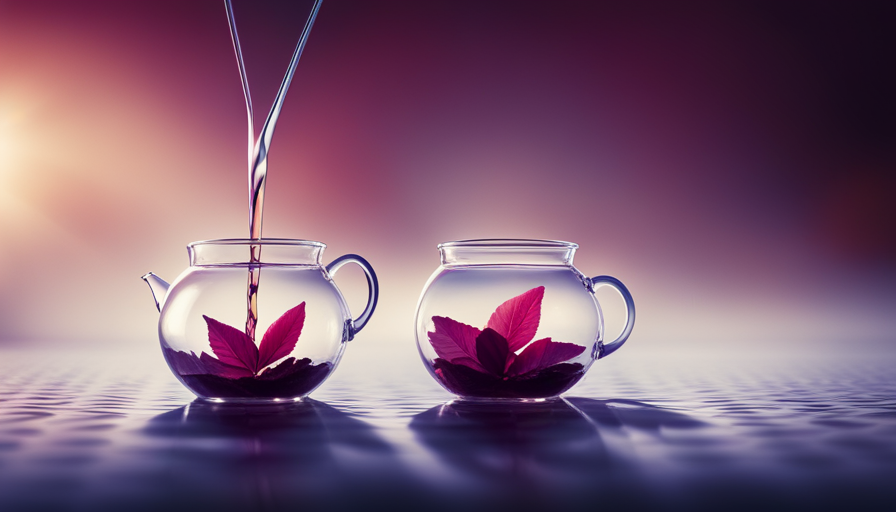
 Turmeric Tea4 weeks ago
Turmeric Tea4 weeks agoWhat Teas Have No Tannins
-

 Turmeric Tea3 months ago
Turmeric Tea3 months agoHow To Make Turmeric Tea With Powder
-

 Turmeric Tea2 months ago
Turmeric Tea2 months agoHow To Put Turmeric In Tea
-

 Matcha Tea3 months ago
Matcha Tea3 months agoHow To Make Matcha Powder From Green Tea
-

 Turmeric Tea2 months ago
Turmeric Tea2 months agoHow Much Is 500 Mg Of Turmeric In Teaspoons?
-

 Turmeric Tea3 months ago
Turmeric Tea3 months agoBrewing the Perfect Cup of Turmeric Tea
-
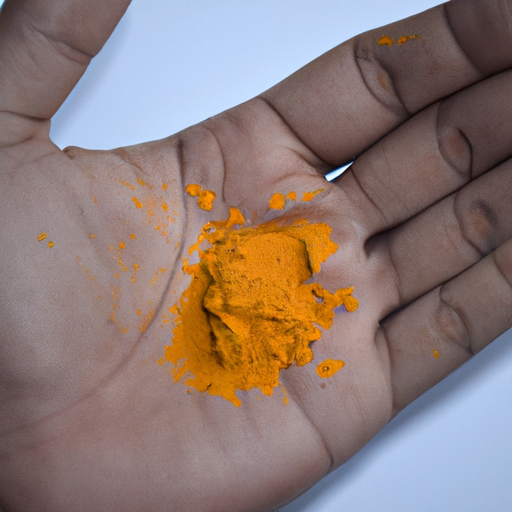
 Turmeric Tea2 months ago
Turmeric Tea2 months agoHow To Use Turmeric To Stop Periods








